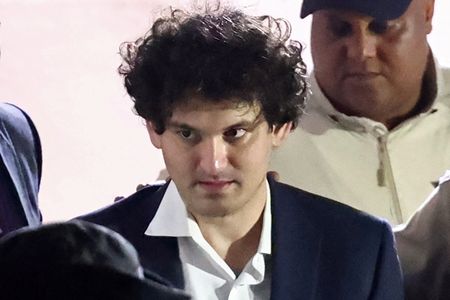By Hannah Lang and Tom Hals
(Reuters) – FTX founder Sam Bankman-Fried was arrested in the Bahamas on Monday and charged by the U.S. Department of Justice on Tuesday with defrauding investors in what regulators called a “brazen, multi-year scheme” that ended when his empire filed for bankruptcy last month.
Here is the latest on the collapse of FTX and what comes next for Bankman-Fried:
WHO IS SAM BANKMAN-FRIED?
Bankman-Fried was raised in California by two Stanford University law professors, Joseph Bankman and Barbara Fried.
Bankman-Fried, 30, started his career at Jane Street Capital after graduating from the Massachusetts Institute of Technology, a choice he has said was influenced by a desire to make money to pursue his interest in effective altruism, a movement that encourages people to prioritize donations to charities.
He amassed a fortune taking advantage of the price differences in bitcoin in Asia and the United States after departing Jane Street in 2017. He eventually started crypto trading firm Alameda Research in 2017 and founded FTX a year later. It was valued in January at $32 billion. Forbes estimated a year ago that Bankman-Fried’s fortune was as high as $26.5 billion.
Bankman-Fried stepped down as CEO of Alameda in October 2021 and ceded the role to Caroline Ellison and Sam Trabucco, who acted as co-CEOs until Trabucco departed the firm in August.
In a Twitter Spaces event held on Dec. 1, Bankman-Fried acknowledged that he and Ellison had “been together for a while,” although he declined to give any more details.
Ellison did not immediately respond to a request for comment.
Known in financial circles by his initials, SBF, Bankman-Fried was an unconventional figure known for his wild hair, t-shirts and shorts. He contributed $5.2 million to President Joe Biden’s 2020 campaign and became one of the largest donors to Democratic political candidates.
WHY DID FTX COLLAPSE?
FTX filed for bankruptcy on Nov. 11 after it struggled to raise money to stave off collapse as traders rushed to withdraw $6 billion from the platform in just 72 hours and rival exchange Binance abandoned a proposed rescue deal.
Bankman-Fried has said that Alameda had built up a substantial position on FTX and that as digital asset prices plummeted this year, Alameda became increasingly more levered.
“Realistically speaking, (there was) no ability for FTX to be able to liquidate that position and generate everything that was owed,” he said at the New York Times’ DealBook Summit in a Nov. 30 interview with Andrew Ross Sorkin.
The liquidity crunch at FTX came after Bankman-Fried secretly moved $10 billion of FTX customer funds to Alameda Research, two people familiar with the matter told Reuters.
Bankman-Fried told Reuters in November the company did not “secretly transfer” but rather misread its “confusing internal labeling.”
He also told Sorkin that he “wasn’t trying to comingle funds,” but said that when FTX did not have a bank account, some customers wired money to Alameda and were credited on FTX, which likely led to discrepancies.
WHY WAS HE ARRESTED?
Bankman-Fried was arrested in the Bahamas at the behest of U.S. prosecutors shortly after 6 p.m. on Monday (2300 GMT). The Bahamas attorney general’s office said it expects he will be extradited to the United States.
U.S. prosecutors said Bankman-Fried had engaged in a scheme to defraud FTX’s customers by misappropriating their deposits to pay for Alameda’s expenses and debts and to make investments.
He also defrauded lenders to Alameda by providing them with false and misleading information about the hedge fund’s condition, and sought to disguise the money he had earned from committing wire fraud, prosecutors said.
Separately, Bankman-Fried was sued by regulators on Tuesday.
The U.S. Securities and Exchange Commission alleged Bankman-Fried defrauded investors in FTX by raising more than $1.8 billion in equity while concealing that the company was diverting customer funds to Alameda.
Also on Tuesday, the U.S. Commodity Futures Trading Commission accused Bankman-Fried and his companies of fraud and making fraudulent misstatements of material fact.
Bankman-Fried said he was pressured into filing for bankruptcy and into nominating John Ray as chief executive of FTX in November by Sullivan and Cromwell lawyers who were advising his firm at the time, according to a draft of his testimony to Congress seen by Reuters that he had prepared to give on Tuesday.
FTX did not immediately respond to a request for comment.
WHAT WILL HAPPEN TO HIM NOW?
Bankman-Fried is expected to be extradited to the United States where he will be formally arraigned and a judge will determine if he will be held in jail or released until his trial. Bankman-Fried said on Tuesday, however, that he would not waive his right to an extradition hearing.
Prosecutors and regulators would typically agree that the criminal charges, which have a higher burden of proof, would be pursued while the civil cases are stayed, according to legal experts.
Bankman-Fried could try to work out a deal that encompasses both the criminal and civil cases.
Prosecutors will seek restitution for proceeds derived from Bankman-Fried’s alleged crimes, but it may be difficult to locate assets, according to legal experts.
(Reporting by Hannah Lang in Washington and Tom Hals in Wilmington, Del.; Editing by Matthew Lewis)

